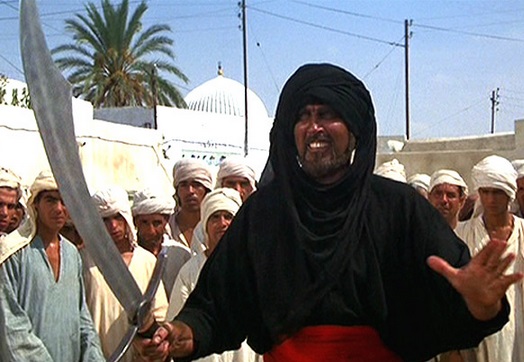  |
 |
 |
 |
|
MahdiWatch.org
|
 |
|
Home | About Me | Links to My Articles | Info on My Books | Contact Me
|
 |
|
Welcome to MahdiWatch.org! NEWSFLASH! COMMENTS LINK
BELOW EACH POST IS ENABLED! FEEL FREE TO BURY ME, PRAISE ME--OR JUST ISSUE A PERSONAL FATWA!
al-Mahdi is "the rightly-guided one" who, according to Islamic Hadiths (traditions),
will come before the end of time to make the entire world Muslim. Over the last 1400 years numerous claimants to the
mantle of the Mahdi have arisen in both Shi`i and Sunni circles. Modern belief in the coming of the Mahdi has
manifested most famously in the 1979 al-`Utaybi uprising of Sa`udi Arabia, and more recently in the ongoing
Mahdist movements (some violent) in Iraq, as well as in the frequently-expressed public prayers of former Iranian
President Ahmadinezhad bidding the Mahdi to return and, in the larger Sunni Islamic world, by claims that Usamah bin Ladin
might be the (occulted) Mahdi. Now in 2014 Mahdism is active in Syria, as the jihadist opposition group Jabhat al-Nusra
claims to be fighting to prepare the way for his coming; and in the new "Islamic State/caliphate" spanning
Syrian and Iraqi territory, as its leadership promotes the upcoming apocalyptic battle with the West at Dabiq, Syria. This site will track such Mahdi-related movements, aspirations, propaganda and beliefs in both Sunni and Shi`i
milieus, as well as other Muslim eschatological yearnings.
For a primer
on Mahdism, see my 2005 article, "What's Worse than Violent Jihadists?," at the History News Network: http://hnn.us/articles/13146.html; for more in-depth info, see the links here to my other writings, including my book on Mahdism.
|
|
|
Sunday, July 16, 2017
This Is The End of Mahdiwatch--but I Have A New Website!
Followers of "Mahdiwatch.org:" I've had this website for almost 11 years, but as you've probably noticed
I've been blogging less and less in the last year or so. Partly this is because I've resumed college teaching; but also
because I've been busy writing books AND because I have many interests other than Islamic eschatology, and have been loathe
to include musings about those on this site. Therefore, on advice of counsel (who is also my wife), I've got a
new website and blog: https://occidentaljihadist.com/ That blog will cover not just Islamic End Time beliefs, but also, as I put it there, "culture and geopolitics." Mahdiwatch
will remain up for several more weeks, then be terminated with extreme prejuedice. Thanks to those of you who have followed
this site for years. By the way: many of the writings on this site can be found in my books Sects, Lies, and
the Caliphate and Ten Years' Captivation with the Mahdi's Camps. These (and my other two books) are available
at my Amazon author page. Thanks again. And head on over to "The Occidental Jihadist!" 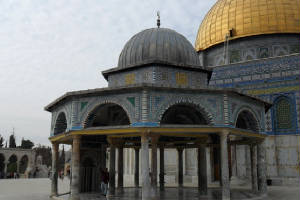
Saturday, January 7, 2017
Misunderestimating Mahdism in the Muslim World--Yet Again
I should be prepping syllabi for the four Reinhardt University history classes I'm teaching this term, but in clearing off my desk I found an October 2016 article from
The Economist--"Apocalypse Postponed: Islamic State's Loss of Dabiq"--upon which I had never gotten around to commenting. So, in the interest of apocalyptic analysis,
and not just procrastination, here goes.... 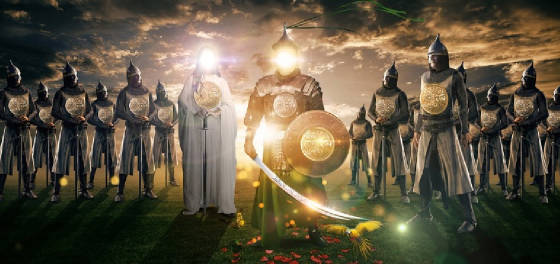 The Mahdi flanked by his right-hand man, Jesus, and the rest of his posse. The Mahdi flanked by his right-hand man, Jesus, and the rest of his posse. As usual with articles in that publication,
the knowledge of the target subject is a mile wide but about a millimeter deep. The momentous battle of Dabiq to which
ISIS aspires (based on a hadith, or saying, of Muhammad's) is described several times as the "end-of-days" conflict--when
in point of fact this battle will not usher in the end of the world but, rather, Islamic conquest thereof
(according to mainstream Islamic eschatology, NOT just ISIS's allegedly-"extremist" understanding). The
Economist describes ISIS' eschatology as a "theology of death, judgment and the end of the world." But that
is not true at all. Death for infidels (both dhimmi--Christian and Jewish--and heretical Muslim)
is not the goal, but rather the primary methodology by which Islamic rule is extended over the whole world; there is nothing
in any of ISIS' many Dabiq publications about judgment at all, much less about riding to ruin and the world's ending. The article presents ISIS' eschatological fervor "more as a recruitment tool than a tenet of faith"--but
then my friend and Islamic apocalypse expert Dr. David Cook is adduced, and he says no such thing. Ratcheting up its level
of ignorance, the author of this article (adducing this time an "expert" who seems to know little of the topic)
then blames ISIS' Sunni eschatology on borrowings from Twelver Shi`ism--betraying a total ignorance of Sunni Islam's long,
bloody history of Mahdist violence. Mahdism such as ISIS exhibits is then described as "nihilistic," when
in reality it is not meaningless at all but quite well-thought-out and volitional. This massive misunderestimating of Mahdism is typical of the Western intelligentsia (and, alas, probably of the intelligence community
for the past eight years, as well). Three major points: 1) Mahdism has been as major a movement among Sunni
Muslims as among (Twelver) Shi`is over the last 14 centuries--if not more so. The Economist's ignorance of this is
breath-taking. While journalistic unfamiliarity with, say, the 12th century founder of the al-Muwahhids, Ibn Tumart, is to
be expected, one might reasonably hope that writers on the Muslim world would have heard of the 19th century Sudanese Mahdi
or the 1979 attempted apocalyptic coup in Mecca. Those, and other such movements, past and present, are detailed in my two relevant books: Ten Years' Captivation with the Mahdi's Camps: Essays on Muslim Eschatology, 2005-2015 and the older
Holiest Wars: Islamic Mahdis, their Jihads, and Osama bin Laden. 2) Likewise, the whole thrust of the article--in particular its dubious
claim that eschatological beliefs are cynically manipulative and not deeply-held--shows that the writer never bothered to
do any research on the power of Mahdist belief today. Well over 40% of all the world's 1.6 billion Muslims (Sunni as well
as Twelver Shi`i) expect the Mahdi to come (back) in this lifetime, as I explained in a long 2012 article. So apocalyptic messianism is not some "extremist" outlier in Islam, but is rather quite mainstream
and widespread. 3)
Finally, the vacuity of this article is well-illustrated by the illustration used therein: 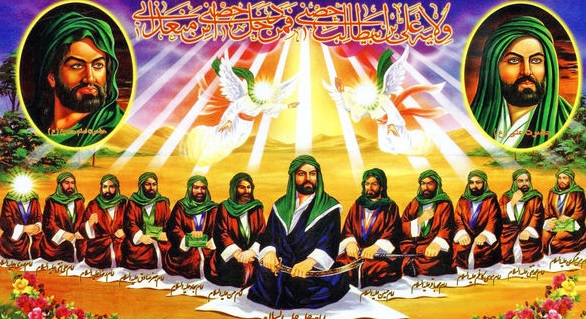 Attack of the Cloned Twelver Imams. Attack of the Cloned Twelver Imams. Those are the 12 Imams of, yes, Twelver Shi`ism. ISIS and the hundreds of millions
of Sunni Muslims do not believe in them but, rather, in a Sunni military-political leader who will emerge from their ranks
and be (eventually) acknowledged as Allah's rightly-guided one and divine instrument for Islamic conquest of Earth--not in
a bloodline descendant of Muhammad who has already been here and gone into mystical ghaybah ("occultation")
for over a millennium. This would be akin to writing an article about
Evangelical Christian theology and putting a picture of St. Peter's in it.
Saturday, October 29, 2016
For ISIS, All's Well That Ends Well
Two weeks ago the Islamic State of Iraq and al-Sham (ISIS, or ISIL if you prefer to speak
of the “the Levant” rather than “greater Damascus) lost control of the town of Dabiq to Turkish-backed Syrian rebel militias. Readers of this site, and of my books—especially Ten Years’ Captivation with the Mahdi’s Camps—know that since its caliphal inception, in the summer of 2014, ISIS has been trumpeting the view that the Islamic eschatological
stopwatch had been set running and that the great apocalyptic battle at Dabiq, between Muslim and Christian forces, would
take place in or near Dabiq. 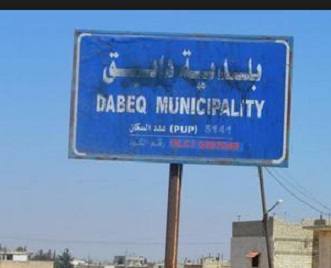 Happiness is Dabiq, Syria, in your (Toyota) rear view mirror? Happiness is Dabiq, Syria, in your (Toyota) rear view mirror?
Many journalists and analysts, both Left and Right, have taken their cues from Muslim leaders
and fighters opposed to ISIS and proclaimed the town’s liberation from Islam’s primary eschatologists to be a
“bitter blow” and even a “big defeat.” No doubt it’s the former—but is it really the latter, as my good friend and astute analyst Ryan
Mauro contends? Disappointed
eschatological expectations are not unique to ISIS, but are a common occurrence in Islamic history (as well as in Christian—but
that’s a topic for another day), as I documented in my 2001 doctoral dissertation “Eschatology as Politics, Eschatology
as Theory: Modern Sunni Arab Mahdism in Historical Perspective,” in the spinoff book Holiest Wars: Islamic Mahdis, their Jihads, and Osama bin Laden (Praeger, 2005) and, most specifically, in a paper which I presented at a 2008 conference in Iran, “Through a Glass Darkly: A Comparison of Self-Proclaimed Mahdist States throughout History to the Theory of the (True) Mahdist
State Yet to Come.” Three major examples illustrate my point. Ibn Tumart claimed to be the (Sunni) Mahdi in 12th
c. Morocco and his al-Muwahhid (Almohad) followers went on even after his death (a fact hidden by the group’s inner
circle) to conquer most of North Africa and establish a Mahdist state which held, as the central article of faith, that the
founder had indeed been whom he claimed. The medieval (Shi`i) Fatimid rulers of Egypt claimed for over 200 years that
each of the sultan-caliphs was also the Mahdi present on earth, despite waning power and the inexplicable refusal of other
Muslims, as well as Byzantine Christians and Crusaders, to submit to this assertion. And the true believers in Muhammad
Ahmad as the “Sudanese Mahdi” (of Khartoum movie fame) refused to abandon him as such, even 13 years after his death, as explained in “The Man Who Believed in the Mahdi.” Reinterpretation of relevant hadiths (alleged sayings of Muhammad’s) and events is the key to
this kind of reality denial, as engaged in by the author of the latter. Muhammad Ahmad never ruled over the whole earth,
but only greater Sudan? Well, the Qur’an sometimes uses “earth” (al-ard) to refer to a single region.
He did not receive pledges of loyalty in Mecca? Recognition of the true Mahdi can be done in one’s “spiritual
Mecca.” He never led Jesus in prayer? We don’t know whether Jesus secretly might have come to earth in the
past and prostrated behind the Mahdi. No angels proclaimed Muhammad Ahmad’s Mahdiyah? They actually did—but
only the most pious Mslims heard them. And finally, what about other Muslim leaders’ rejection of his claim? The
true Mahdi has no need of such mundane assistance. 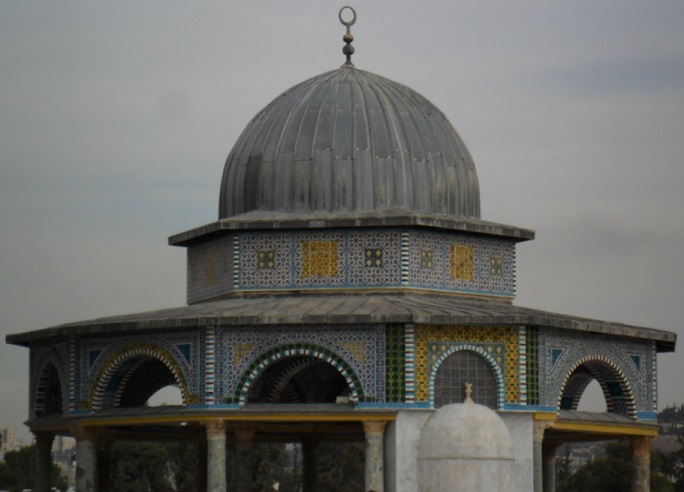 Qubbat al-Silsilah, "Dome
of the Chain"--right next to Dome of the Rock, and the site where all humanity will queue up for Judgment, LONG after
the Mahdi and Jesus have ceased to rule. Qubbat al-Silsilah, "Dome
of the Chain"--right next to Dome of the Rock, and the site where all humanity will queue up for Judgment, LONG after
the Mahdi and Jesus have ceased to rule.
Using such an absolving
hermeneutic, here’s what ISIS could say about the loss of Dabiq in light of the relevant hadith (number 6924
in that collection), which has been adduced in several issues of Dabiq *The Romans (Byzantine Christians/Crusaders/Americans) had not yet “landed”
in any force *A (Muslim) army had not yet come from Medina, because ISIS has not yet
conquered Saudi Arabia *ISIS is not
yet holding any “Roman” [American] POWs. *“We don’t have to actually hold Dabiq—the major battle just must take place near
there.” Any or all of these rationalizations would likely hold water, in light of previous examples from Islamic history.
So ISIS can, and likely indeed will, simply move the eschatological goalposts: IF ISIS manages to procure some American (or perhaps Russian) soldiers as POWS AND the
Americans (or Russians) insert ground forces to rescue them AND ISIS takes over Saudi Arabia such that ”true Muslim”
armies could come from Medina, THEN the vital battle of Dabiq will be nigh. Look for
such exegesis in upcoming issues of ISIS’ new Rumiyah magazine, which even before Dabiq fell out of ISIS control had replaced the predecessor Dabiq magazine. (This new publication
Rumiyah—“Rome” in classical Arabic—may not indicate a loss of eschatological faith on ISIS’
part, as some contend, so much as a reinvigorated desire to take the fight to the “Romans” on their own soil and,
indeed, a revitalization of the intent to conquer them—and us.)
Indeed, ISIS’ rank-and-file, and probably even much of its leadership, truly would
believe their own exculpatory propaganda—for despite shoddy Western “analysis” such as The Economist has recently provided, ISIS’ eschatology is neither “nihilistic” nor a “flight of fancy”—and
in point of fact, it is not actually about the end of the world at all, but simply a description of how
the world becomes Muslim. In Islamic eschatology, the coming of the Mahdi, Jesus and the Dajjal (“the Deceiver,”
or “Antichrist”) ushers in the Islamic conquest of Earth, not its ultimate demise. (The actual End, along
with Judgment and consignment of souls to heaven and hell, takes place long after, in an entirely different realm of events.)
So ISIS can refigure hadiths and reinterpret events in ways that make sense to many of the millions of
Muslims who hold to traditional Sunni views of such matters (as I wrote about in 2012). Thus, ISIS’ loss of Dabiq may prove to be not its comedy of eschatological errors, but instead allow al-Baghdadi
to claims all’s well that, eventually, ends well. 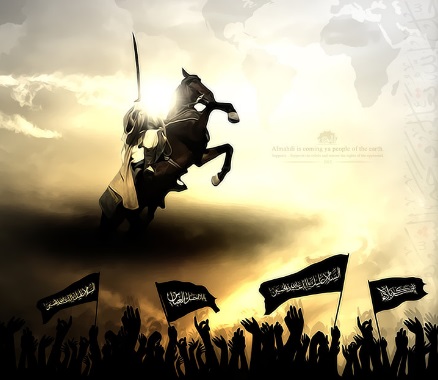 The Waiting Is the Hardest Part--but he WILL come, no matter who holds Dabiq! The Waiting Is the Hardest Part--but he WILL come, no matter who holds Dabiq!
Thursday, October 13, 2016
Apocalypse Later?
Time to get back in the saddle again--the eschatological one, that; it's been three months since my last post, thanks to knee surgery, teaching
again, writing, and sons playing football on different teams. God willing readers of this blog will forgive me--if they
haven't consigned me to the well out back of Jamkaran mosque. Apocalypse--mainly, but not only,
Islamic--remains at the top of the headlines lately. ISIS is fighting to hold onto the town of Dabiq, in northern Syria--where it believes, as per relevant Muslim hadiths, that its forces will defeat a massive
Christian army and usher in the coming of the Dajjal, Mahdi and Jesus and (eventually) a global caliphate. Contra much reporting and analysis, however, belief in the Mahdi and attendant eschatological themes is
not limited to ISIS and "extremists" in the world's second-largest religion. This past July the state of Perak,
in Malaysia started investigating a chap claiming to be the Mahdi and that his "deviationist" group was stockpiling weapons and planning to proclaim their leader
as Mahdi in Mecca. In August of this year, following the failed military coup in Turkey, the head of that country's
religious affairs (what in the good old days the Ottomans called the "grand mufti") blamed the revolution manqué on that "fake Mahdi," Fethullah Gülen (the exiled neo-Sufi leader living in Pennsylvania).
Of course, Westernized, intellectual Muslims like Mustafa Akyol argue that the many hadiths about the Mahdi (and Jesus) making the world Muslim by force "might
be better read metaphorically." But this is also true of the Qur'an itself--and, unfortunately, a literalist exegetical
paradigm still holds sway, especially in Sunni Islam, and looks to continue to do so for the forseeable future (as I explained on national radio in 2015). Never fear, however; for, as U.S. Presidential candidate
Hillary Clinton assures us, "I'm the Last Thing Standing Between You and the Apocalypse"--although whether she or her rival Donald Trump is actually the Dajjal remains to be seen. 
Tuesday, July 12, 2016
Dousing ISIS' Apocalyptic Spark in Libya
This week Eurasia Review published my article on how ISIS (ISIL/"Da`ish") is trying to leverage extant eschatological traditions in North Africa, and what
might be done about it. 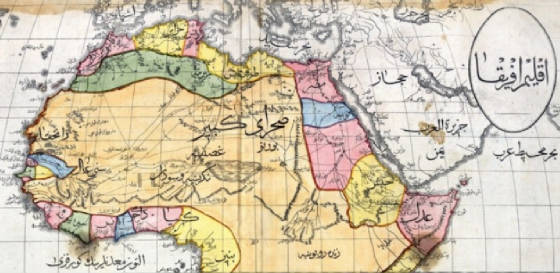
And no, the following is not one of my suggested policies toward ISIS
in Libya...yet: 
|

|
|
2017.07.01 |
2017.01.01 |
2016.10.01 |
2016.07.01 |
2016.06.01 |
2016.05.01 |
2016.04.01 |
2016.03.01 |
2016.02.01 |
2016.01.01 |
2015.12.01 |
2015.11.01 |
2015.10.01 |
2015.07.01 |
2015.06.01 |
2015.05.01 |
2015.04.01 |
2015.03.01 |
2015.02.01 |
2015.01.01 |
2014.11.01 |
2014.10.01 |
2014.09.01 |
2014.08.01 |
2014.07.01 |
2014.06.01 |
2014.05.01 |
2014.04.01 |
2014.03.01 |
2014.01.01 |
2013.12.01 |
2013.11.01 |
2013.10.01 |
2013.09.01 |
2013.08.01 |
2013.07.01 |
2013.06.01 |
2013.05.01 |
2013.04.01 |
2013.03.01 |
2013.02.01 |
2013.01.01 |
2012.12.01 |
2012.11.01 |
2012.10.01 |
2012.09.01 |
2012.08.01 |
2012.07.01 |
2012.06.01 |
2012.05.01 |
2012.04.01 |
2012.03.01 |
2012.02.01 |
2012.01.01 |
2011.12.01 |
2011.11.01 |
2011.10.01 |
2011.09.01 |
2011.08.01 |
2011.07.01 |
2011.06.01 |
2011.05.01 |
2011.04.01 |
2011.03.01 |
2011.02.01 |
2011.01.01 |
2010.12.01 |
2010.11.01 |
2010.10.01 |
2010.09.01 |
2010.08.01 |
2010.07.01 |
2010.06.01 |
2010.05.01 |
2010.04.01 |
2010.03.01 |
2010.02.01 |
2009.12.01 |
2009.10.01 |
2009.09.01 |
2009.08.01 |
2009.07.01 |
2009.06.01 |
2009.05.01 |
2009.04.01 |
2009.03.01 |
2009.02.01 |
2009.01.01 |
2008.12.01 |
2008.11.01 |
2008.10.01 |
2008.09.01 |
2008.08.01 |
2008.07.01 |
2008.06.01 |
2008.05.01 |
2008.04.01 |
2008.03.01 |
2008.02.01 |
2008.01.01 |
2007.12.01 |
2007.11.01 |
2007.10.01 |
2007.09.01 |
2007.08.01 |
2007.07.01 |
2007.06.01 |
2007.05.01 |
2007.04.01 |
2007.03.01 |
2007.02.01 |
2007.01.01 |
2006.12.01 |
2006.11.01 |
2006.10.01

|
|
|
| Jamkaran Mosque near Qom, Iran (during my trip there Aug. 2008) |
|
|
|
